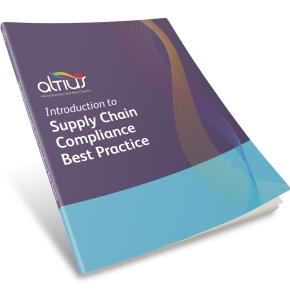
The right way to use Audits
When overdone, Audits can be a drain on both you and your contractor or sub contractor, but if used correctly they can be very effective, according to Altius.
Seeing something with your own eyes gives you extra confidence and can offer powerful insights to help improve the supplier relationship. This can be an expensive and ineffective way of achieving your goals if used wrongly.
Contractors can become proficient at passing audits, rather than proficient at the task they are employed for, if used too frequently.
Defining the purpose clearly is the key to a successful audit and the best auditor will add little value if they’re not given a clear idea of what you are looking for evidence of. It is likely that without this clarity of purpose, the contractor, and indeed the auditor, will fail to meet the customers’ expectations.
Audits should be used to find out if your processes have worked, particularly for processes that bring about specific outcomes or protect you from risks associated with purchasing goods and services.
If you choose the wrong contractors, they won’t help because of a poor selection process. Nor will they help if you fail to enlighten the contractor as to what you do and don’t want from them.
Audits happen very late in your process and are a sample at a point in time and at a single location.
If the audit finds a problem, then it may not just be saying that the contractor is not good enough, but may actually be telling us that the process that brought us to this point didn’t work or that the right contractor wasn’t chosen in the first place. Is the audit telling us that there is an opportunity for improvement?
If you get contractor selection, wider assessment and communication correct then time and money can be saved by doing fewer audits.
Should you decide to audit your supplier’s sub-contractors, in doing so you take away your contractor’s responsibility. If something goes wrong, they will rightfully point out that you audited them and said they were alright.
It is vital to take a standardised approach and ensure that all teams have the right tools in place to perform to the same high standard, not only including your internal supply chain software, but also the templates, questionnaires and audit forms required. To ensure quality and consistency, robust checks should be in place.
Audits are most effective when used for their intended purpose. You should get a clear idea of the risks associated with buying in products and services and understanding what you will require from contractors to protect yourself from them.
Then you should choose suppliers capable of doing what you want and make sure they understand what it is that you want, including what will be done or delivered and what behaviour and evidence is expected. Use audits to see if everything is as you asked. If it isn’t, make improvements for next time and use audits to see if things have improved.
Contact:
Phone: 01332 960320
Email: [email protected]
Visit Supplier's page
Latest news

26th April 2024
Hush Acoustics optimises fleet operations by securing FORS Gold accreditation
Hush Acoustics has invested in the safety and sustainability of its commercial vehicle fleet by achieving Gold status in the Fleet Operator Recognition Scheme (FORS).
Posted in Acoustics, Noise & Vibration Control, Articles, Building Industry News, Building Products & Structures, Building Regulations & Accreditations, Building Services, Ceilings, Facility Management & Building Services, Floors, Health & Safety, Insulation, Restoration & Refurbishment, Retrofit & Renovation, Site Preparation, Sustainability & Energy Efficiency, Walls, Waste Management & Recycling
26th April 2024
Safeguard Europe: Penetrating damp - how to diagnose the damage
As Safeguard gets ready to deliver another informative session of one of its most popular webinars, the company outlines some of the most common reasons for rain penetration through brickwork.
Posted in Articles, Bricks & Blocks, Building Industry Events, Building Industry News, Building Products & Structures, Building Services, Continuing Professional Development (CPD's), Damp & Waterproofing, Facility Management & Building Services, Information Technology, Posts, Render, Restoration & Refurbishment, Retrofit & Renovation, Seminars, Training, Walls
25th April 2024
ADSA: Competence Initiative Makes Progress
The Joint Competency Initiative (JCI), in which the Automatic Door Suppliers Association (ADSA) is involved, is finalising its first framework for installers within the door, gates and shutter industry.
Posted in Access Control & Door Entry Systems, Architectural Ironmongery, Articles, Building Associations & Institutes, Building Industry Events, Building Industry News, Building Products & Structures, Building Regulations & Accreditations, Building Services, Continuing Professional Development (CPD's), Doors, Facility Management & Building Services, Health & Safety, Innovations & New Products, Publications, Research & Materials Testing, Restoration & Refurbishment, Retrofit & Renovation, Security and Fire Protection, Site Preparation
25th April 2024
BMBI: Value sales in first two months were -3.4% down
The latest Builders Merchant Building Index (BMBI) report shows builders’ merchants’ value sales were down -4.7% in February compared to the same month a year ago.
Posted in Articles, Bathrooms & Toilets, Bathrooms, Bedrooms & Washrooms, Bricks & Blocks, Building Associations & Institutes, Building Industry News, Building Products & Structures, Building Services, Civil Engineering, Concrete, Cement, Admixtures, Drainage, Floors, Hard Landscaping & Walkways, Interior Design & Construction, Interiors, Landscaping, news, Paints, Paints, Coatings & Finishes, Plant, Equipment and Hire, Plumbing, Posts, Publications, Research & Materials Testing, Restoration & Refurbishment, Retrofit & Renovation, Sustainability & Energy Efficiency
 Sign up:
Sign up: